#(It’s a tragedy. By Sophocles.)
Explore tagged Tumblr posts
Text

Sophocles, from "Electra: A Tragedy," translated by Anne Carson
#lit#sophocles#anne carson#electra#words#sometimes i shock myself...#fragments#selections#ancient greek tragedy#p
14K notes
·
View notes
Text
(apologies to my followers here for an off topic post, but i want this to show up in some tags (for once) and my personal account is... hidden from search, lol.)
i recently recovered my old hard drive from my dead laptop, including recovering my theatre bootlegs. one of which is something i've seen people asking about for the past couple of years (and had been trying to find again myself without luck): a BBC4 broadcast of the 2015 Barbican production of Anne Carson's translation of Antigone, directed by Ivo van Hove. it was broadcast twice and never released on DVD or permanent streaming. there used to be public links around, but all of them are dead as of right now that i could track down.
so i have uploaded it to archive.org now i have it again!

i had to convert the mkv to mp4, for reasons of 'my broadband is shit and uploads too slowly', but it's still good quality. anyway, i enjoy this production a lot. i want more people to watch it! i'm glad i could get it back and upload it somewhere.
#antigone#anne carson#sophocles#theatre#ivo van hove#juliette binoche#greek tragedy#classics#video gift#tagamemnon
728 notes
·
View notes
Text
I do think it’s funny how consistently Menelaus is portrayed in Greek tragedy as just, a total asshole. Rude and cruel and just the fucking worst.
This is because Menelaus was the mythic king of Sparta, and Sophocles and Euripides who were writing these plays were Athenian, and more to the point, Athenian living during the Peloponnesian War against Sparta. It’s literally just the ancient version of making all the antagonists in every American movie in the 80s and 90s Russian. Writers going, You know the guys we’re at war with? They SUCK
#tagamemnon#I am reading Sophocles’s Ajax#It’s a poignant tragedy and I feel for Tecmessa and Teucer till the end#I feel for Odysseus’s uncomfortable bafflement#And then Menelaus shows up and he’s just an asshole
976 notes
·
View notes
Text





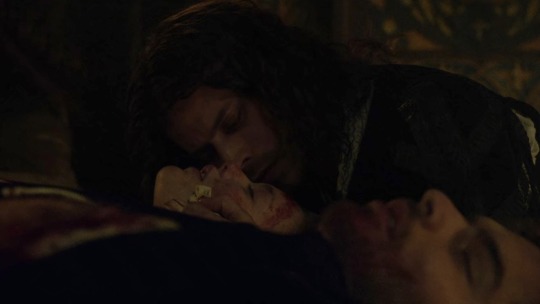
cesare & lucrezia borgia, the borgias (2011-2013) dir. neil jordan / antigonick, sophocles, trans. anne carson
#this came to me in a vision#cesare x lucrezia#web weaving#the borgias#anne carson#antigonick#antigone#sophocles#neil jordan#greek tragedy#cesare borgia#lucrezia borgia#quotes
482 notes
·
View notes
Text
Yeah sorry about your boyfriend… turns out he’s actually your son you thought you had killed 2 decades ago. Oh yeah he also killed your late husband… yeah the oracle was right
#oedipus#oedipal complex#oedipus Rex#ulysses dies at dawn#your boyfriend meme#boyfriend meme#the mechs#the mechanisms#Allison has jokes#agtigone#Sophocles#greek tragedy
1K notes
·
View notes
Text









Elektra How terrible that one who speaks well should be so wrong.
Chrysothemis You have truly described the fault to which you cling.
Elektra What? Do I not seem to you to speak justly?
Chrysothemis But sometimes even Justice causes harm.
Elektra I do not want to live by such laws.
—Sophocles, Elektra 1039-43
#traduttore traditore#stichomythia#στιχομυθία#dark academia#dark acadamia aesthetic#classic academia#classics#sophocles#electra#the oresteia#grey academia#classical studies#ancient greek#tragedy#tagamemnon#ἐποίησα
66 notes
·
View notes
Text
Getting into Greek mythology is the worst (best) thing to ever happen because *slavery* *demigods* *war* *the iliad* *greek tragedies* *everything is just fanfictions to everything else there’s no original there’s no right myth where do I even begin* *percy Jackson* *the odyssey* *song of achilles*
#I’m now going down the rabbit hole of Greek tragedies and holy shit Idek where to start and I’ve read more than five in the past few days#don’t think I’ll ever be out of this phase#like people had been writing Trojan war fanfic since Homer#and Greek mythology fanfic for even longer#my mind cant comprehend#greek mythology#ancient greece#the iliad#the odyssey#greek tragedy#sophocles#euripides#aeschylus#homer#greek gods#Percy Jackson#the song of achilles#the trojan war#trojan war#paris of troy#odysseus
73 notes
·
View notes
Text
The Humanity of Odysseus: Fear, Pity and Honor (an analysis based on Sophocles's "Ajax")
This analysis has been suggested/requested by my amazing friend @artsofmetamoor with whom we are dealing with various of projects, mainly W.I.T.C.H high fantasy related material! Please visit her profile and check her amazing art!
So as you see from various accounts and much more my recent analysis in regards to whether Odysseus is someone without actual essence of right or wrong, we have one of the few cases in which we have a more complicated Odysseus rather than the usual anti-hero figure we have in post-homeric tradition. Sophocles in his tragedy "Ajax" tells the story of Telamonian Aias, how he lost his sanity when he became furious that the armor of Achilles was not given to him. It wouldn't be an exaggeration to say that Odysseus opens and closes the tragedy by being in both the first and the last scene. In the first scene we have one of the most hilarious (and daresay extremely modern even for today's standards) dialog between Athena and himself. Athena has just explained to Odysseus what happened to Aias and then proceeds to call him, earning this HILARIOUS reaction by Odysseus!

Odysseus: What are you doing, Athena?! Don't call him to come out! Athena: Easy there! (Lit: Hold up, or Keep your posture), are you taken over by cowardice? Odysseus: Don't, by gods! If you please, let him stay inside! Athena: What's the matter? Isn't he the same man he was? Odysseus: A man who was an enemy, especially now
(Translation by me)
Okay, other than the fact we have the absolutely HILARIOUS moment of Athena going in a "What are you? Chicken?" mode with Odysseus (which has me laughing to this day!) we also have an increasingly panicking Odysseus! From the moment he hears Athena go "Hey, Ajax!" from outside you can almost see him jumping out of his skin! We even have him go increasingly more panicked when he says "By gods, don't!" like the last thing he wants is to come face to face with a 2m tall behemoth of a man who not only has a personal grudge against him but also now he is mad and murderous. And his anxiety is also shown by some low-key homor he does even when Athena talks again:

Athena: Certainly isn't it the sweetest taunt, the taunt of one's enemy? Odysseus: For me is enough that he stays inside his chambers! Athena: Are you afraid to see the madman? Odysseus: I wouldn't be so terrfied of him if he were sane (Lit: If he were in fact, sane, I would lift my fear) Athena: But now he won't see you being present near Odysseus: How? If he sees with his own eyes?
(Translation by me)
Okay we have once more Athena being cheeky (like a very interesting trope) basically sayng "why? don't you want to laugh at your enemy?" and Odysseus answering with equal humor in a "thanks but no thanks!" manner! Like "nah I'll pass!" but I find it also interesting how honestly Odysseus speaks with Athena. If other people call him coward he retaliates and in fact most of the time he is prudent but now he is truly terrified and he is not afraid to admit that to Athena who, let's face it, knows his soul. He is so afraid to the point of forgetting that gods can do stuff humans find impossible and he even asks her how she would achieve that Aias won't see him. He doesn't ask if she will protect him. He asks HOW she'll do it! XD

Athena: I will darken his eyes so he won't see clearly Odysseus: Indeed, everything is possible when the gods are acting Athena: Then, be silent now and stay where you are! Odysseus: I'll stay: even if I'd rather be anywhere but here!
(Translation by me)
Honestly...I love this to no ends! Odysseus finding some composture in a "Oh! Right!" mode as he remembers it's Athena we are talking about, Athena basically be like "Shut up and stay still!" mode as if she talks to a dog and Odysseus whom I can so imagine mumbling that last part to himself is just an amazingly human roller coaster for Odysseus who even if he has the wits that all people would wish to have, he still is blocked by fear like everyone else. And then we have another amazing detail and scene here;
Aias comes out in all his mad glory, covered in blood of the sheep he killed and holding a bloody whip. Athena asks him questions and Aias answers how he ellegedly killed the greeks and how he captured Odysseus in his tent! He then proceeds speaking on the gruesome death he has in store for his rival, that he wil whip him to death (And again cheeky Athena inserting some dark humor like "Don't hit the poor man too hard!") She then turns to Odysseus as if expecting praise! She basically asks him "Well? What do you think of the power of the gods?"
And how does Odysseus respond?

Odysseus: Well, I don't know of anyone: however I pity him, the poor man, even if he is an enemy, for he is taken over by this devastating delusion. Neither do I think myself better than this purpose; I can see that we who live are nothing more than deaf shadows.
(Translation by me)
Not only does he recover from the shock and fear even after he heard all the horrendous things mad Aias wants to do to him but he now pities Aias; He knows he used to be a powerful dignified king who is now reduced to a shadow of himself in madness and he pities his condition but he also PUTS HIMSELF IN HIS SHOES! He sees that he as well can easily become him! He admits that he doesn't feel any better than him, that he is also weak before the gods and he even speaks on how humans basically are pointless, temporary existences on earth compared to the immortals.
Athena even closes the scenes with a threat. She threats Odysseus never to be blasphemous to the gods because the gods can do this and much more to a man. In a way we also have a foreshadowing or an "easter egg" of the Odyssey here. In a way that threat or warning coming out of Athena coming in place.
However his humanity for his elleged enemy doesn't stop there for later he is the only one of the offended party of greeks to actually insist upon allowing Aias to be buried with honor. I will not speak on the moments where he says some of the most iconic things like "I hated him when it was honorable to hate him" which was done by another tumblr creator @ilions-end here
The clip that this analysis talks about is not his unparalleled diplomatic nature but rather the humaity that we analize here. And some of the phrases he uses to put himself in Aias's shoes as well as the people who love him and want to see him get honors after death. One of the phrases he uses, which seems to reflect to the words he gives to his wetnurse Euryclea (you can see in my other analysis) in which basically he advises her not to take pleasure upon the face of death. Sophocles seems to place a similar word to his mouth here with:

Odysseus: Do not rejoice, Son of Atreus, to take benefit from something not good
(Translation by me)
Basically Odysseus here shows once more the other side of his; the need to be just to others. He advises Agamemnon that he should never be happy by taking revenge with an unholy act such as leaving someone without a decent funeral. Despite the fact that in Iliad for example in the heat of battle he often threatened to leave someone without a funeral, in reality here in a calm environment he realzes that one must be just before the gods. Despite the fact that Aias threatened to do unspeacable things to him, he seems to recognize not only his pain and misery but also the nobility of his spirit to which he feels sorry to see derranged like that. Odysseus KNOWS it is not noble or right to leave someone yet alone such an honorable man without a funeral and he knows the consequences of that act would anger the gods and make them become something they ellegedly should be looking down upon.
Odysseus advises against feeling joy with such type of revenge.
Of course one can argue that it would be for his own personal benefit as well to do some last act of kindness to the man that felt wronged by the decision to hand the arms of Achilles to him (and depending on the source seems that the anger was quite righteous). However it seems to me that it is his genuine drive to do it right at least in the end, in a way showcasing one more time the complexity of character in Odysseus; a man who often makes severe mistakes or even brings controversy to the table but at the same time he has a large fose of humanity inside him and a strong will to make things right
Quite frankly Sophocles is ranking as one of my favorite post-homeric sources for Odysseus's persona and inspiration apart from my top favorite Homeric version exactly for this reason. Because we can experience the many different human emotions of this character called Odysseus of Ithaca! In this one play we see Odysseus freeze in fear even his mind having trouble to work for a second in his worry, then he experiences pity and compassion for the man that had murderous intentions towards him and finally the final tribute to that said man; having surpassed all the previous carousel of emotions he experienced and finally seeing clearly what is the right decision to make.
But what do you guys think? Let me know! ^_^
#odysseus#greek mythology#the odyssey#tagamemnon#odyssey#aias#sophocles ajax#sophocles#katerinaaqu analyzes#ajax#telamonian ajax#ajax the greater#odysseus being the most relatable character for 2800 years straight#odysseus and athena#athena#epic cycle#ancient greek tragedies#homer odysseus#agamemnon#odysseus of ithaca#greek myths#heroes of trojan war#trojan war
62 notes
·
View notes
Text
The thing about brocedes still living in the same building makes me wanna munch my walls because on one hand I am convinced they're basically playing gay chicken except the first one to move out of that condo is not gay but implicitly admits to be psychologically weaker so now the fight is not about who wins the championship but who can recover more swiftly from 2016 and pretend he's unbothered by losing one of the most meaningful relationships of his life, it's psychosexual and unbelievable and uselessly painful and nobody really wins so they're both fucking ridiculous, they really said after the most heartbreaking friendship breakup ever documented on live tv let's be a little silly let's prolong our rivalry to levels only reached by american sitcoms
On the other hand
On other hand it makes perfect sense. They're not gonna move out because moving out would mean letting the fight die which would mean getting out of eachothers lives forever. Because when the fight ends we can't go back to being friends so I'd be forced to simply leave you behind and I can't do that. Let's keep up the fight, let me keep us for a little more, out of spite if not out of love. Yes I hate you and I can't even say your name and I won't call you on your birthday but please let me pretend it's out of my hands if I see you in the hallway one morning and then I hide behind a door. Until we live in the same building I have an excuse to see you without admitting I want to. Without testing my pride to see if I had the courage to come to you when we had no chance to meet on the stairs anymore, because I don't think I would allow myself that and I know I would suffer tremendously for it. We can't be a part of eachothers lives anymore because I've hurt you too much and you've done the same, we can't go back, but please don't let me move forward. You won't speak to me anymore but let me at least see your face once in a while. Not on posters or tv or internet, your face, without filters and the perfect lighting, with eyebags and imperfect hair and anything other than the press-trained smile because that is- was my friend, the man on tv- I don't know who that is. And it's my home, my home, understood, you can't force me out of it like you forced me out of your life so you move first if you want to move but I don't want to. It's my home and you were my friend and I'll be damned if I let you take anything else away from me again. I can't bear you in my life and I can't bear you out of it. Let's keep things muddy and confused and ridiculous, let's not ever put an end to this. Remind me everyday why I hate you rather than go away and force me to think maybe I still care about you more than I have ever hated you. Do not let this heal, because who knows if one of us will ever have the courage to go back to this car crash to see if there's still something that can be saved. I will stay here, forcing you to look around before you leave your apartment and check the flight of the stairs to see if I'm coming up when you need to go down, like a monster always hidden in a dark corner, like a ghost I will haunt you. I will force my presence into your life, if not in your home, at your table, in your living room, then in the corner of your eye, in a set of steps you could never not recognise, in a shadow approaching the hallway. The hurt will persevere and so will the love, in this new wretched form. We swore we would always be at eachothers side, we never said how. No, I won't move out and I won't move on. Allow me to force you to do the same.
#brocedes#it's missing them hours#it's munching drywalls hours#it's hitting my head on the wall hoping the physical hurt will distract me for the emotional hurt hours#something something the love was there and all it did was make this worse#their whole *agitates hands in the air* resonated with me more than I would want to#I stay awake at three am thinking about them#Sophocles is rolling in his graves because he couldn't write a tragedy about them#lewis hamilton#nico rosberg#f1#formula 1#long post
97 notes
·
View notes
Text
NEW PROJECT!
phia saban will play antigone in robert icke’s west end production of ‘oedipus’.
the west end production of ‘oedipus’ is playing at the wyndham’s theatre from 4 october 2024, running to 5 january 2025.


the production is adapted and directed by robert icke and is a modern day production set on election night, with sophocles’ epic tragedy transformed into an essential, explosive human thriller.
#house of the dragon#hotd#hotd s2#tv shows#phia saban#queen helaena targaryen#helaena targaryen#antigone#cast#new projects#instagram story#oedipus#wyndham’s theatre#robert icke#actors#greek mythology#mythological character#ancient greek tragedies#sophocles#adapted to modern times
36 notes
·
View notes
Text


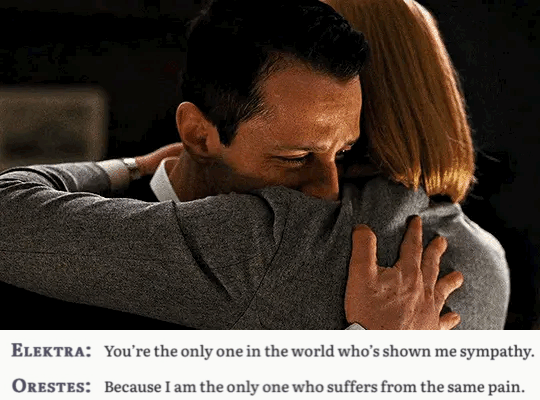
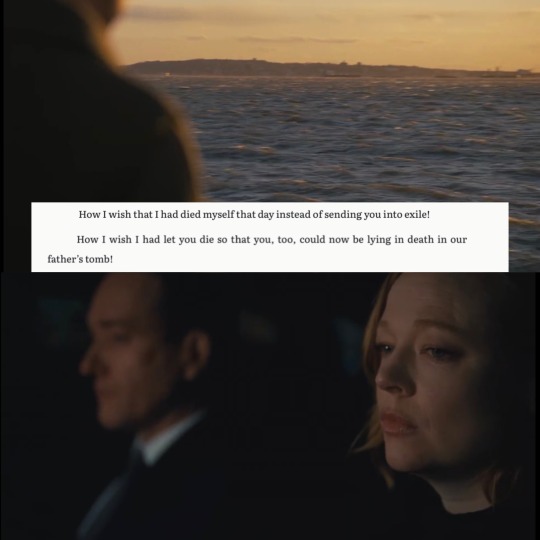
kendall & shiv / elektra & orestes
#shiv roy#kendall roy#succession#succession spoilers#succession s4#succession web weaving#electra#greek tragedy#sophocles#connections#web weaving#parallels#alt text
291 notes
·
View notes
Text

Sophocles, from "Electra: A Tragedy," translated by Anne Carson
247 notes
·
View notes
Text
obsessively thinking about antigone tonight. queer antigone / antigone as a product of incest displaying incestuous undertones&themes herself / married through death antigone (anouilh’s antigone, who wanted to have her first time with hemon the evening before she goes to bury her brother, who wanted to die not-a-virgin and yet not-a-wife but who didn’t, because they fought instead) / antigone who only knows how to live for oedipus / antigone who only knows how to die for her brothers / antigone who is nothing but her love for her family / antigone who leaves ismene behind / antigone who knows her brothers have been cursed by her father but still goes back to thebes, because she has to / antigone who knows creon will remove the dirt she puts on polyneikes’ body, but still puts it there, because she has to / antigone ready to die, born to die / antigone already dead from the beginning, her fate sealed long ago / antigone leaving thebes as a child knowing she will only come back to die.
#antigone#it’s probably my favorite tragedy#which says a lot because i love many ancient tragedies#but antigone ?#i love her so much#i have so many versions of her story now#plays : sophocles (3 translations including one by anne carson) / anouilh / cocteau#novels : henry bauchau’s oedipus on the road + antigone#and it breaks me every single time#classics#oedipus#jocasta#ismene#eteokles#polyneikes#polynices
88 notes
·
View notes
Text
Antigone and Electra are very similar characters, but the pinnacle difference is the relationship to their family. Both are from very prominent tragic and cursed royal bloodlines, but they have vastly different relationships to them. Electra is a member of the House of Atreus, but she doesn’t want to be. Her actions and her love for (certain members) of her family is in spite of her lineage. She is her mother’s daughter, and she doesn’t want to be. Antigone does all she does *because* of her lineage. The House of Laius is cursed, and she does not deny it. She is unequivocally her father’s daughter and does all she does because of it.
#greek mythology#greek tragedy#classics#greek literature#electra by sophocles#electra#Electra by Euripides#elektra#antigone#antigone by Sophocles#having a lot of thoughts about them lately#tagamemnon
35 notes
·
View notes
Text
ok i wrote an entire essay on this for class but i keep thinking about it and i really need to get off my chest how utterly devastating it is that antigone truly is doomed by the narrative.
a lot of academics look at her story as an example of athenian literature which opposes the normative gender ideology of their society because antigone is a woman inserting herself into a political sphere with no conventional place for women, especially as it was often held in athenian society that obedience to men was a feminine virtue, which antigone directly subverts by not only standing against creon but doing so publicly.
but, antigone's actions were driven by her will to adhere to the social norm of surviving women in a family performing funerary rites for the deceased men. this isn't really touched upon in sophocles from what i remember, but antigone isn't just determined to complete polynices' funerary rites because he's her brother—the completion of these rites was a position normally held by women of a family, and the responsibilities of daughters to their families wasn't considered extinguished by marriage or any such thing, so even if antigone had been married to haimon by this point the responsibility still would have fallen to her—but she would have felt a duty imposed by the societal norms placed upon women to honour polynices. this therefore obviously creates a conflict — on one hand (μὲν) society expects her to honour her brother's funerary rights, but on the other hand (δὲ) if she does so she's not only publicly disobeying a male authority figure but in a way which threatens to prevent her from marrying and preserving her family line, which was also considered a daughter's responsibility.
in choosing to disobey creon, antigone has been rendered useless as a bride in his eyes, because this rejection of the status quo has resulted in her trespass of the societal boundaries of her gender and she's therefore no longer considered able to serve the expectations of women, so creon declares that she's to die. but if she hadn't disobeyed him, socially she's still failed to uphold the familial responsibilities demanded of her following the normative gender ideology, and so even if no one would have spoken up directly about it because she's followed creon's command, either by wilful perception or subconscious judgment she likely would have been seen as a traitor to her family on some level regardless.
what this means is that not only is antigone truly doomed by the narrative, where her choices render her a servant to social expectations of women whether she outright defies authority or unwillingly defies her womanly responsibilities, but that her entire narrative is ingrained with the very gender ideology that dooms her to begin with.
146 notes
·
View notes
Text
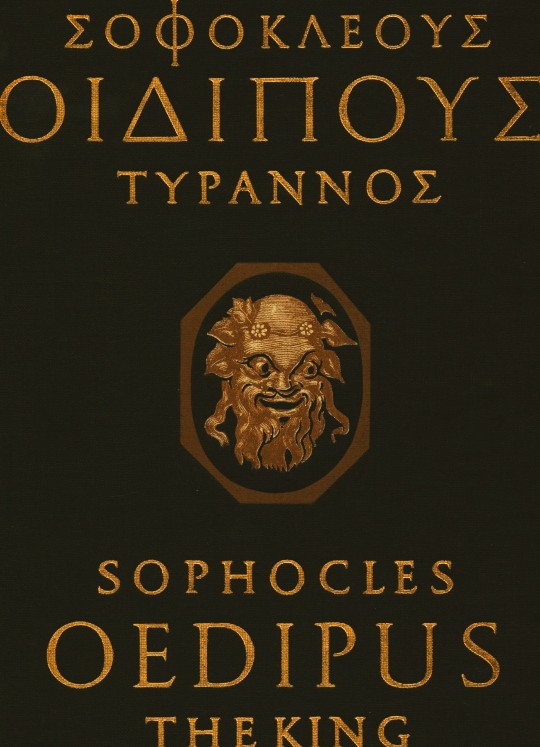
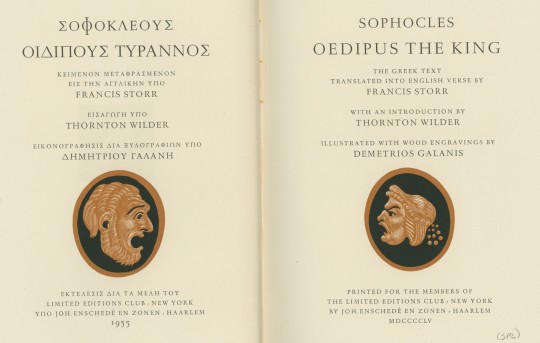
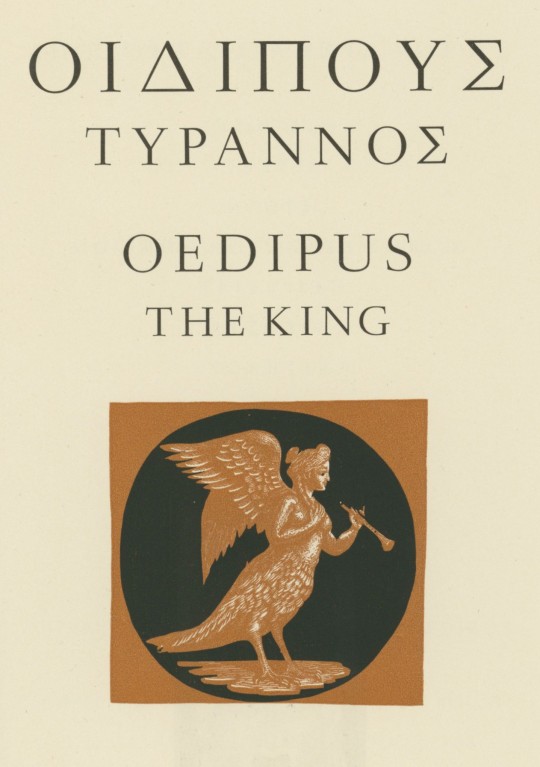


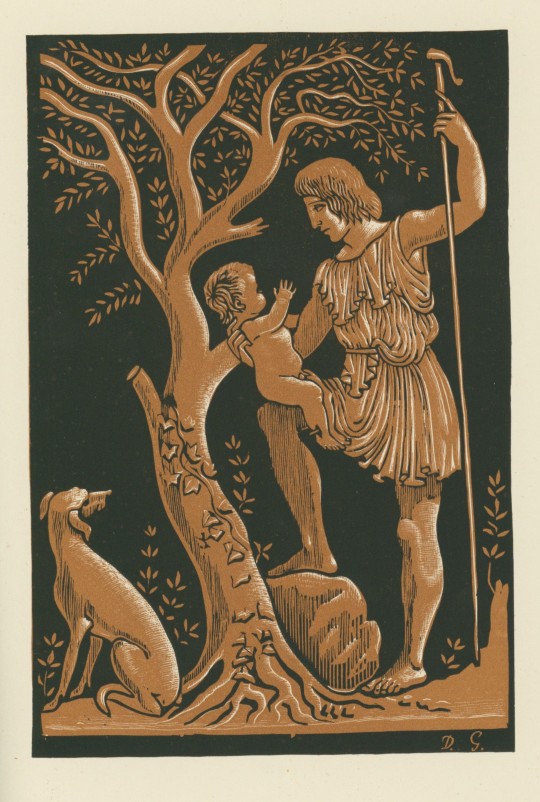
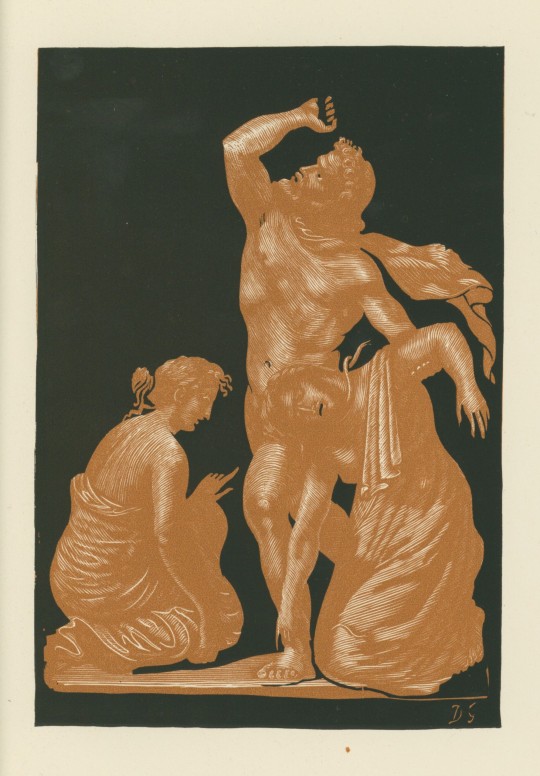

Tragically Greek
This 1955 edition of Oedipus the King, written by Sophocles, features the original Greek text alongside the English verse translation. Offering a rich, immersive reading experience results from hard work, dedication, and creative minds coming together to create this masterpiece.
Jan van Krimpen (1892-1958), Dutch typographer, book designer, and type designer, designed the two typefaces. The Greek type is named “Antigone,” and the English type is called “Romulus.” The translator for this work was Francis Storr (1839-1919), a British classicist, translator, and teacher.
The paper was specially manufactured at the historic Dutch Pannekoek Papermill, a mill with a rich history that unfortunately met its end in a fire in 1944. This exclusive feature adds a touch of rarity to your reading experience. Printed in the offices of Johannes Enschedé, under the supervision of Mijnheer van Krimpen, it was for the members of the Limited Editions Club.
Adding to the richness of this edition is the detailed and insightful introduction provided by Pulitzer Prize winner Thornton Wilder (1897-1975), American playwright, novelist, and native of Madison, WI. His esteemed perspective offers an enlightening preface to the classic tale.
The illustrations are black and terra-cotta wood engravings designed by Greek artist Demetrios Galanis (1879-1966). He was the trailblazer of modern Greek engraving and was once touted as one of the greatest living Greek artists at the time of the book’s release.
Sophocles (c. 497/496 – winter 406/405 BC) was an ancient Greek playwright born in Colonus near Athens. He is one of the three great tragedians of classical Athens, along with Aeschylus and Euripides. Sophocles wrote over 120 plays during his lifetime, although only seven have survived in their entirety. His works are characterized by their complex characters, well-crafted plots, and profound exploration of moral and philosophical themes.
Among his most famous plays is the tragedy Oedipus the King. The story is about Oedipus, the king of Thebes, who tries to uncover the truth behind a plague that has struck his city. In doing so, he discovers that he himself is responsible for the plague, having unknowingly killed his father and married his mother. The play delves into themes of fate, free will, and the consequences of one's actions.
-Melissa, Special Collections Classics Intern
View other Classics posts
#classics#sophocles#oedipus#oedipus rex#oedipus the king#greek mythology#greek#wood engraving#athens#tragedy#greek tragedy#ancient greece#oedipus complex#Limited Editions Club#Johannes Enschedé#Enschedé#Jan van Krimpen#Antigone type#Romulus type#Francis Storr#Demetrios Galanis#Pannekoek paper#LEC#Thornton Wilder#Melissa
61 notes
·
View notes